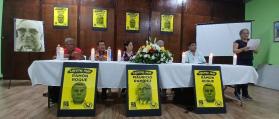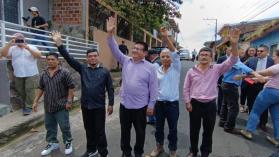Legislative Assembly 'Turns Its Back on Women,' Rejects Abortion Reform
On October 20, El Salvador’s New Ideas–controlled Legislative Assembly voted to uphold the country’s absolute abortion ban, rejecting a penal code reform from feminist organizations to decriminalize the procedure in limited circumstances. The vote (76/84 against) has been widely denounced by feminists and other progressives as demonstrating a “profound ignorance” of the realities faced by women and girls in El Salvador, especially those living in poverty.
El Salvador has some of the harshest anti-abortion restrictions in the world, with prison sentences ranging from several to 40 years. But the law wasn’t always so extreme. Before 1998, abortions were legal (if not widely available) in specific circumstances including in cases of incest or sexual assault, when the fetus was nonviable, or when the woman’s life would be put at risk by carrying the pregnancy to term. It was a reform to the penal code in 1998, introduced by the far-right ARENA party and deeply if clandestinely funded by conservative and evangelical groups based in the United States, that removed all exceptions and banned abortion completely. A Constitutional amendment that followed shortly thereafter designated conception as the beginning of life and established the category of “aggravated homicide,” which led to the draconian sentencing laws. The restrictions disproportionately affect poor, rural girls, women, and trans folk.
Feminist organizations presented the proposal to the Legislative Assembly on September 28. Titled the “Beatriz reform” (in honor of a young Salvadoran woman whose personal battle and public role in collective struggle marked a “before and after” in El Salvador’s reproductive justice movement), the initiative sought decriminalization of abortion on three specific grounds: to save the life of the woman, when the life of the fetus outside the uterus is nonviable, and in cases of sexual assault. The reform would have returned the penal code to its pre-1998 status, when those exceptions were recognized. Importantly, the reform proposal featured inclusive language to address the needs of all people capable of conceiving, including trans men, who also may experience unwanted pregnancies, other violations to bodily autonomy, or various types of discrimination that require reproductive care.
The reform was voted down by all 56 Nuevas Ideas representatives in the Assembly as well as by conservative allies in the ARENA, GANA, PDC, and PDN parties; two FMLN legislators, Dina Argueta and Anabel Belloso, abstained while Johnny Wright, founding member of the Nuestro Tiempo (Our Time) party voted in favor of the reform. The wide rejection has drawn outrage from feminist and progressive sectors: The National Health Forum condemned the decision, reminding legislators that "twenty-three years after the absolute criminalization of abortion, women continue to inflate the death statistics in public hospitals due to obstetric complications resulting from gender violence and lack of access to sexual and reproductive health."
Organizations have also denounced the fact that an issue with such profound impacts on the lives of women, girls, and trans folks was considered only briefly in the Legislative and Constitutional Issues Commission. “In the past, we at least had robust debates where we could enter scientific, legal, and other types of evidence, data, or international recommendations, standards, and rulings to support our position, but this time, the proposal was shelved with hardly any discussion at all. . . It was barely an hour of “debate”—that word in many, many quotes. Basically they’ve turned their backs on women,” feminists said in a recent podcast episode on the topic. The Association for the Decriminalization of Abortion agrees: “We have witnessed only meager debate, based on arguments and religious beliefs that reflect a profound ignorance of the realities faced by girls who are forced into pregnancies and maternity.”
Groups also criticized the conspicuous lack of legal knowledge among Nuevas Ideas legislators regarding the technical aspects of the proposal. Spokesperson Morena Herrera from the Feminist Collective condemned as “total ignorance” statements from Deputy Mauricio Ortiz that claimed the reform would require a Constitutional amendment. As a penal code reform, the proposal would require no Constitutional changes.
For his part, President Bukele has changed his position on abortion since being elected, breaking earlier promises. On the campaign trail, he voiced support for exceptions to the abortion ban in certain cases—such as when the life or health of the woman was at risk—and even criticized conservative sectors on behalf of Beatriz in 2013. As president, however, Bukele rejected a Constitutional reform to decriminalize abortion presented by Vice President Félix Ulloa, and has even said he considers abortion “a genocide.”
The vote comes on the heels of disturbing statistics released after the initial COVID lockdown period in El Salvador—April, May, and June of 2020—during which the entire population was forced under threat of arrest to quarantine at home. The Ministry of Health reported a 79.16% increase in pregnancies in girls 10 to 14 years of age, and a 71.6% increase among adolescents aged 15 to 19 over that period. Feminist, human rights, and civil society organizations denounced the lack of a gender focus in the administration’s COVID response, particularly in disregarding the risks of confinement and sexual assualt at home.
Despite this particular setback, and despite opposition from an administration that feminists have constantly denounced for promoting violent cisgender, heteronormative, patriarchal attitudes in both speech and policy, movement leaders say that their organizations will continue to fight. “We are convinced of the need to overcome the unjust law that causes so much harm to Salvadoran society. We are going to continue struggling for our rights and for our lives.”

 "I am a CISPES supporter because continuing to fight for social justice and a more people-centered country means continuing the dream and sacrifice of thousands of my fellow Salvadorans who died for that vision.” - Padre Carlos, New York City
"I am a CISPES supporter because continuing to fight for social justice and a more people-centered country means continuing the dream and sacrifice of thousands of my fellow Salvadorans who died for that vision.” - Padre Carlos, New York City

